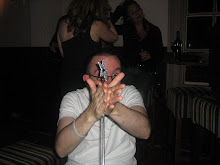So finally a new decade in the Oscar challenge and we move from the tumultous 1940s to the glorious 1950s in which the big screen came alive as technicolour became more and more frequent and the cinemas were dominated by large, colourful epics luckily Oscar still had place in its nomination slots to hnour smaller films that were well written but may've only had two or three sets to their name. And we're starting off with two such films both based in a courtroom setting.
The first of these two films is 1958 nominee Witness for the Prosecution the adaptation of Agatha Christie's novel starring Charles Laughton as the belligerent Sir Wilfred a brilliant barrister who has just returned to his chambers having suffered from health problems. It is not long before Wilfred is visited by a soliciter friend who has a new client - Leonard Vole who is accused of murdering the wealthy spinster Emily French with strong circumstancial evidence pointing towards him as the killer. The only person who can vouch for his whereabouts and act as his alibi is his German wife Christine, here played by the sultry Marlene Dietrich, but Wilfred warns that a testimony from a loving wife doesn't hold up to much. The best scenes of the film happen in the Old Bailey mainly because the set is so impressive, it had been recreated by Alexandre Trauner, and is also where the trial begins The prosecution calls several witnesses before their key witness is revealled as Christine acting as the titular Witness for the Prosecution. Anything I say from there would spoil the film and I was told specifically at the end of the film by a stern voice-over not to tell my friends anything about the film's conclusion. I will say however that I very much enjoyed Witness for the Prosecution and most of that is down to Laughton's performance a mix of drama and comedy he captures what I believe the character needed and ultimately is able to do the right thing. It is odd to see Laughton act this way after portraying a bunch of villains in the 1930s, in films such as Les Miserables and Mutiny on the Bounty, however he did display comic flare in Ruggles of Red Gap and he uses that here getting a Best Actor Nomination but ultimately losing to Alec Guinness. The other Oscar nominee here is Elsa Lanchester who plays Sir Wilfred's fussing personal nurse Miss Plimsoll with whom Wilfred clashes but by the end they have a grudging respect for what the other does while I did enjoy this performance I'm suprised Dietrich didn't get a nomination for playing her feme fatale role to great effect. Sometimes the tone doesn't feel just right, ocassionally the comedy feels misjudged especially since this is a film about an old woman who has been murdered but the great ending which I didn't see coming makes up for any shifts in tone.
Also nominated at the 1958 ceremony was a film which is still my favourite of all time that being the late Sidney Lumet's classic 12 Angry Men. If you haven't seen the film then you need to as, in the words of one of my friends, its good for you but I will indulge you with a small plot summary nonetheless. Almost all of the film takes place in a jury room in which the twelve men who make up the jury are discussing whether the boy on trial killed his father or not and if they find him guilty he will go to the chair. The boy has been raised in a slum and two witnesses atest to seeing the boy stab his father or that they heard him shout that he was going to kill him. Initially only Henry Fonda's Juror Number 8 stands up for the boy voting Not Guilty in the first round of votes so that there can be a discussion about the trial and whether all the evidence was completely accurate. Some people bring their own prejudices to the table for example one juror has a problem with people from slum backgrounds while another lets his personal issues cloud his judgment. The best thing about the film, in my opinion, is the way in which the plot unravels and the characters are given more depth as the time goes on. We only learn two of the juror's names and that only happens in the very final scene instead they are referred to simply by their juror numbers. Despite the cramped setting, filmic techniques are still employed throughout 12 Angry Men including using different shots to focus on either the whole set or one character in particular for example a close-up on Juror Number 4 who in his own words never sweats but is in fact seen persipirating during one key moment. I honestly can't find fault with this film and have seen it so many times and I'm still horrified that it didn't win Best Picture or at least Best Screenplay. The only actor nominated for his role in the film was Fonda which I think is a mistake there are plenty of strong performances most notably from Lee J Cobb as the last angry man Juror No. 3. Overall a masterpiece and that's my final word on the matter.
Subscribe to:
Post Comments (Atom)



No comments:
Post a Comment